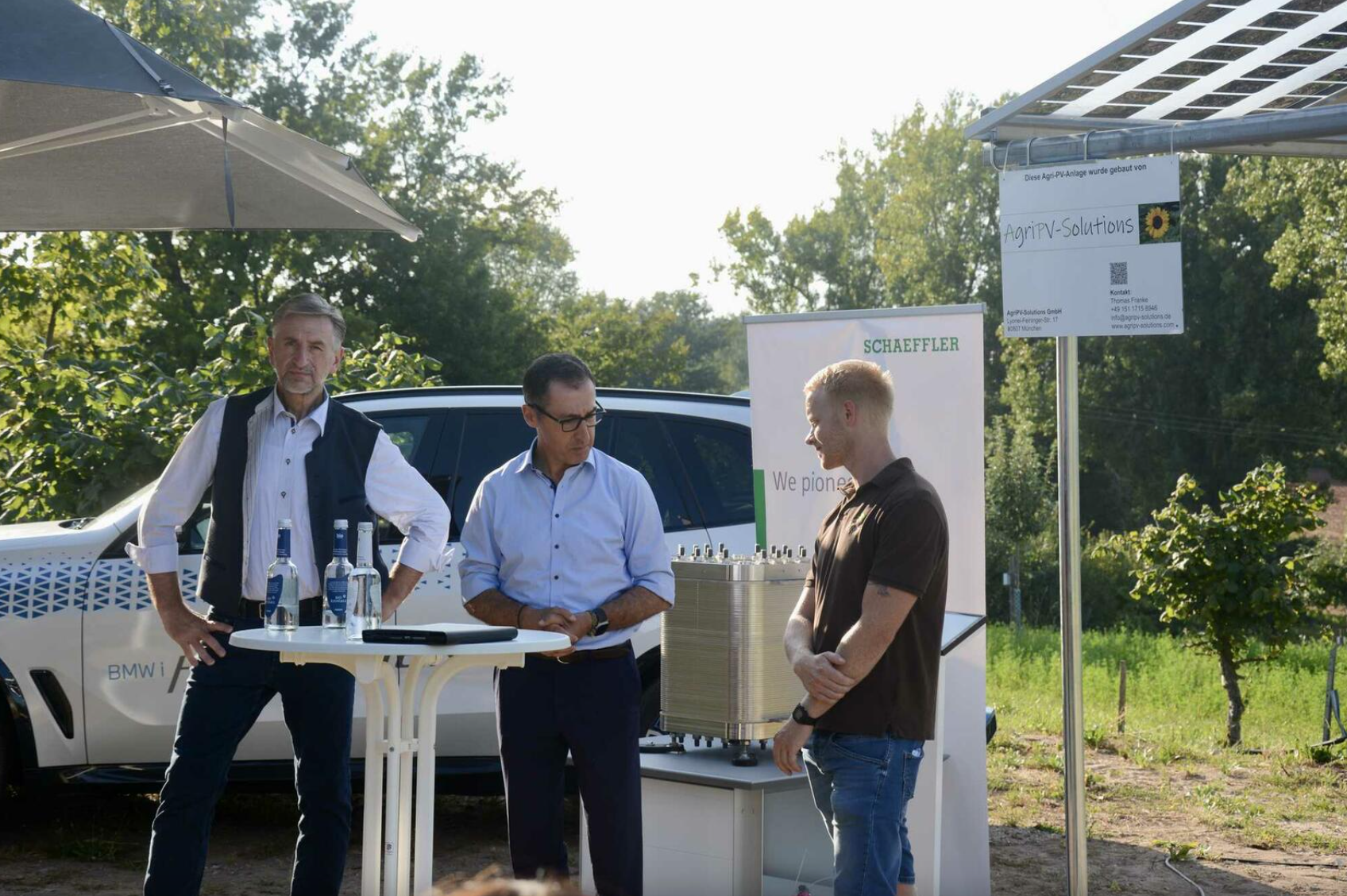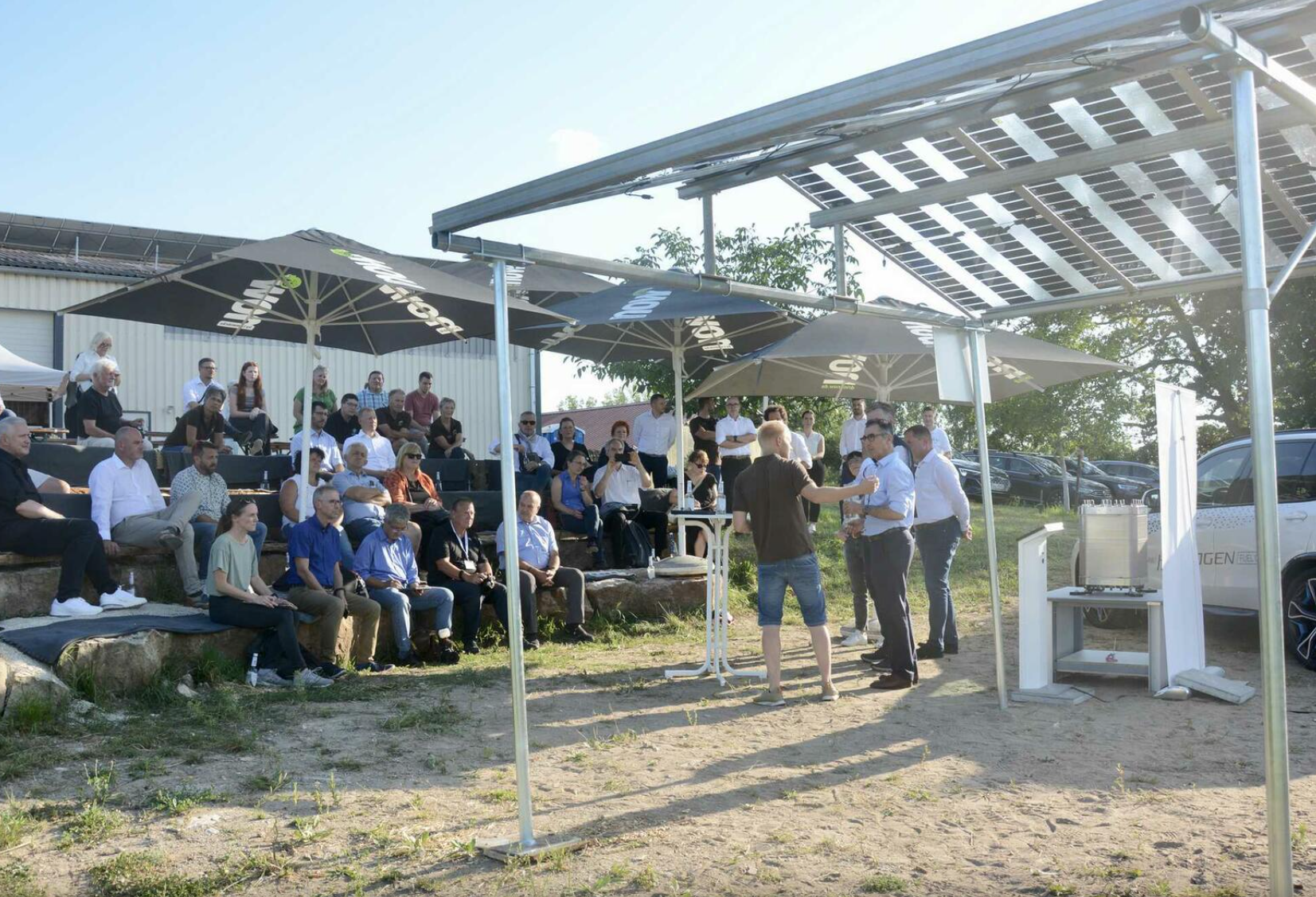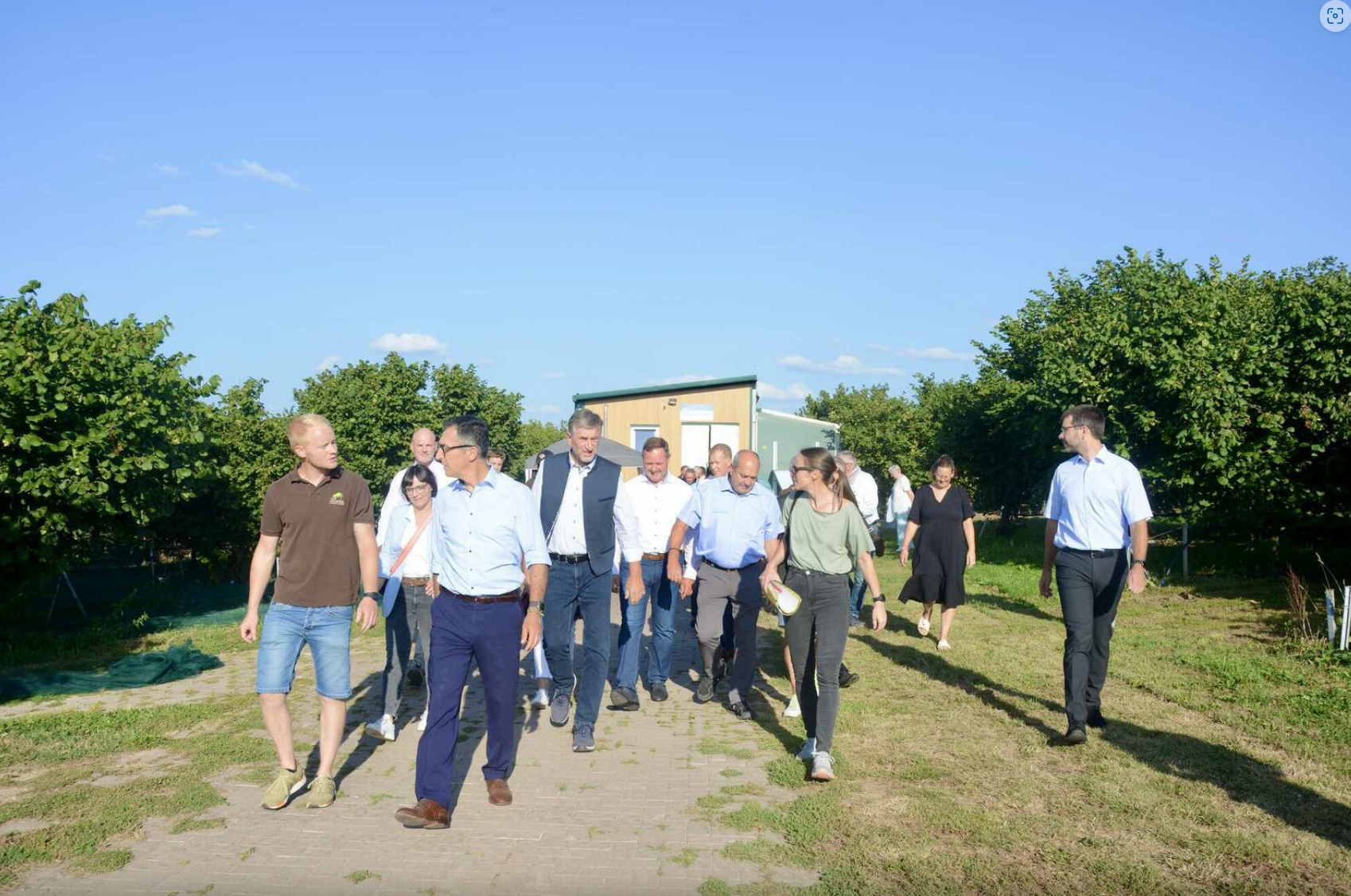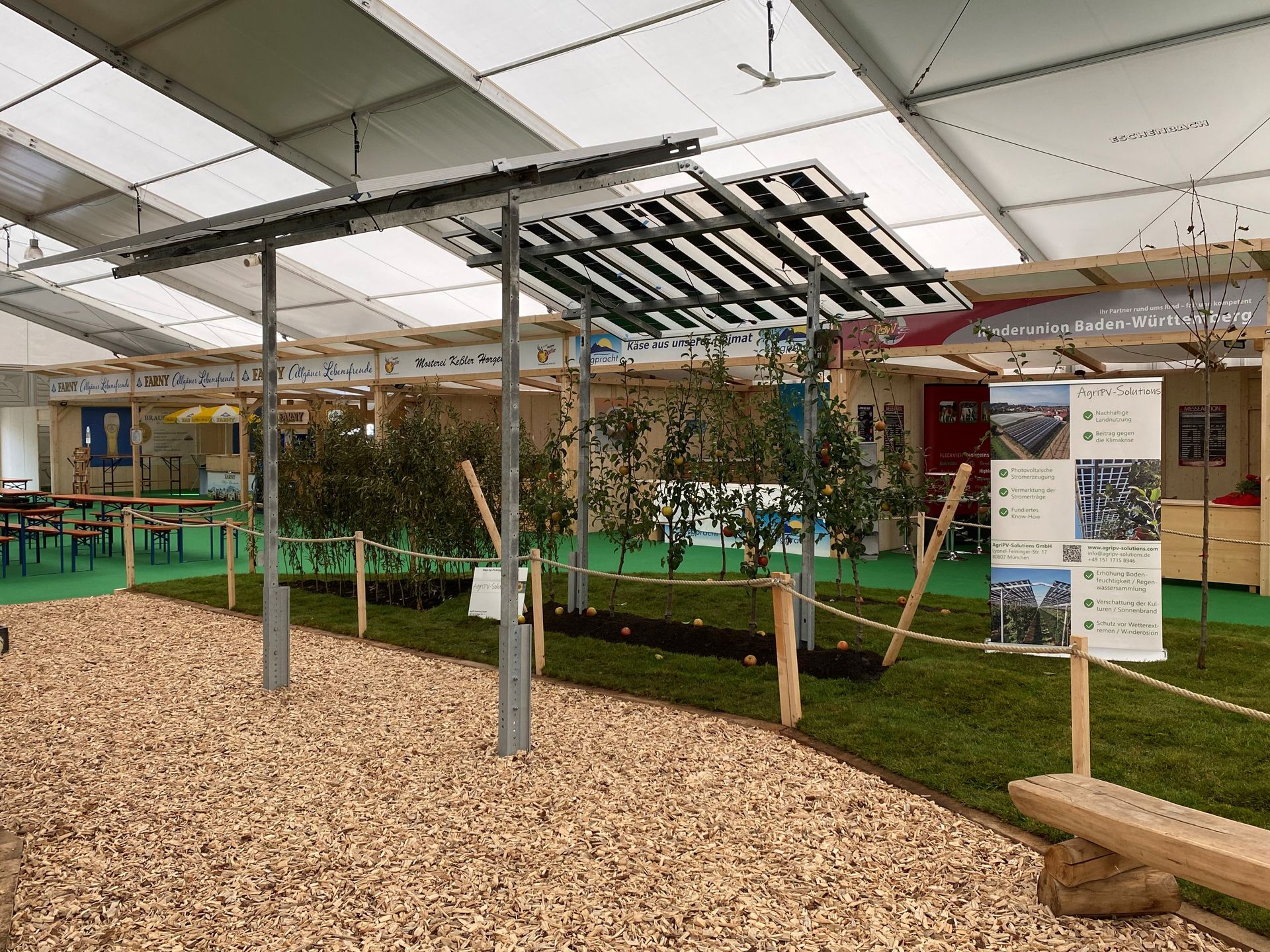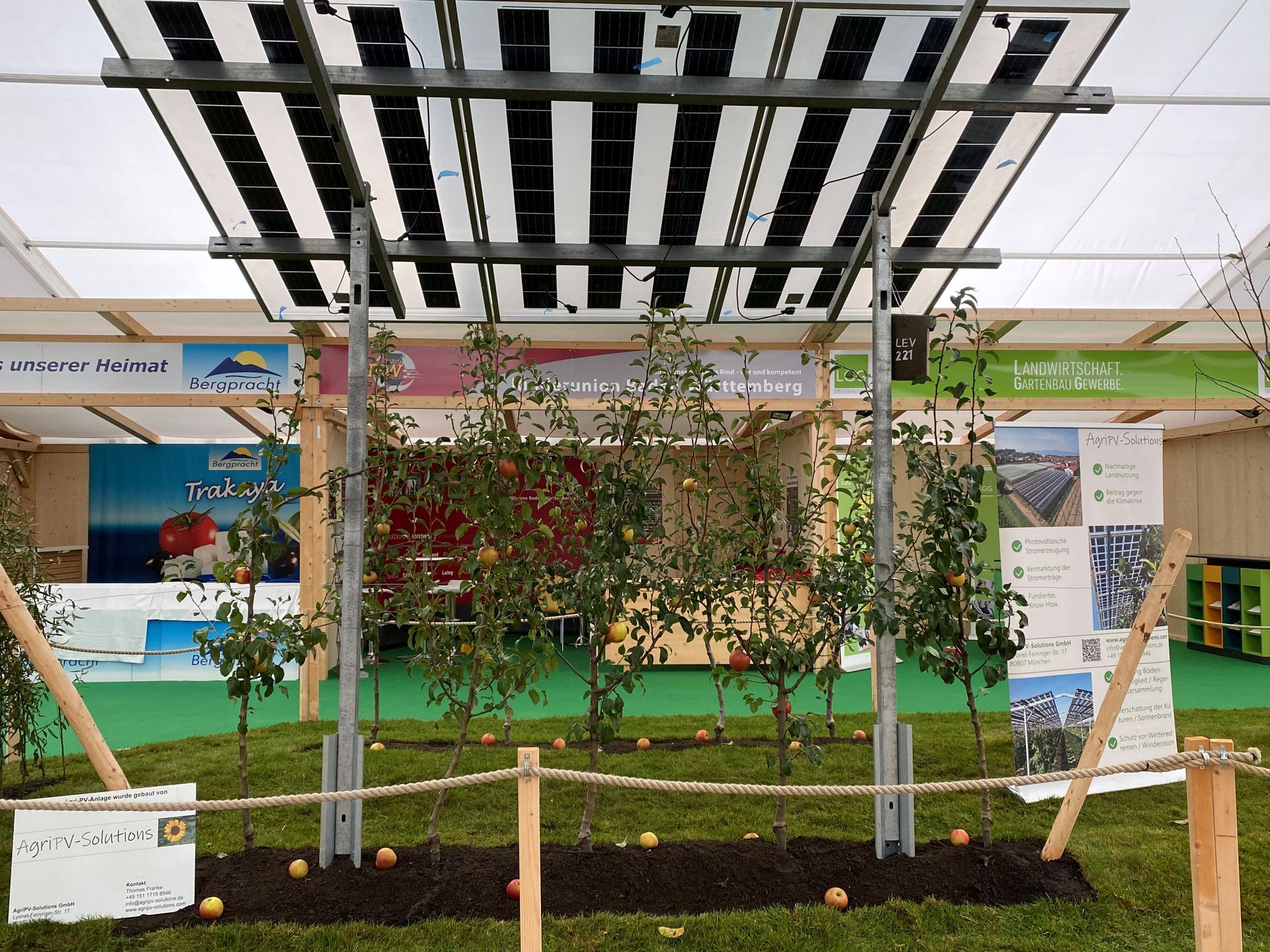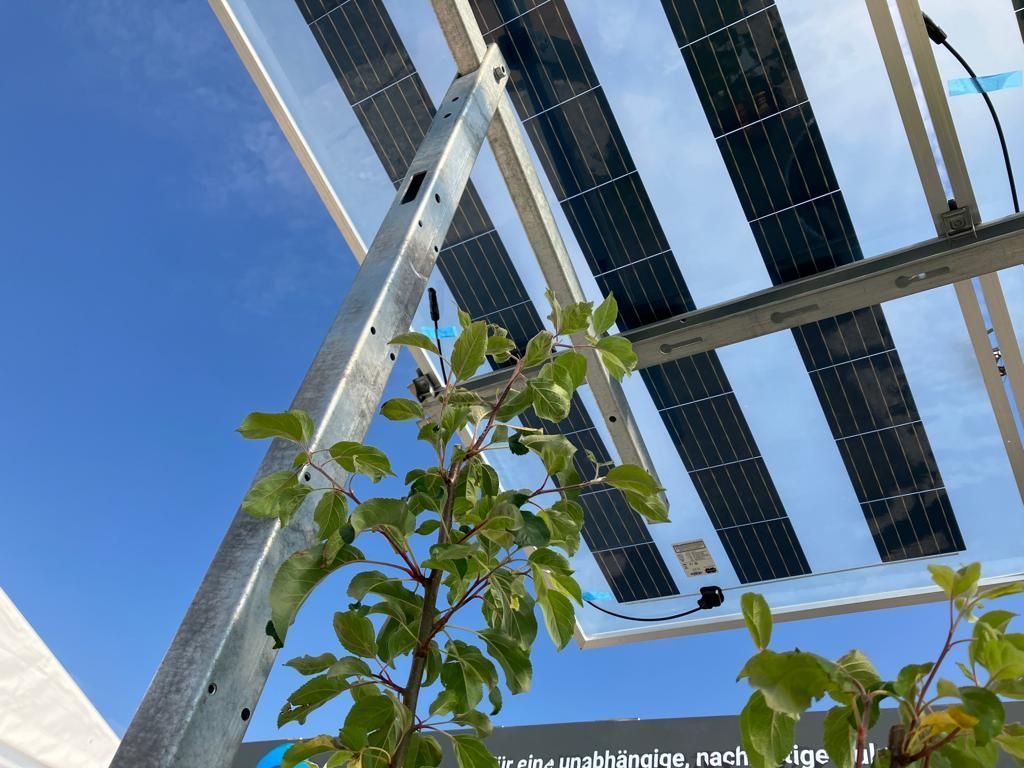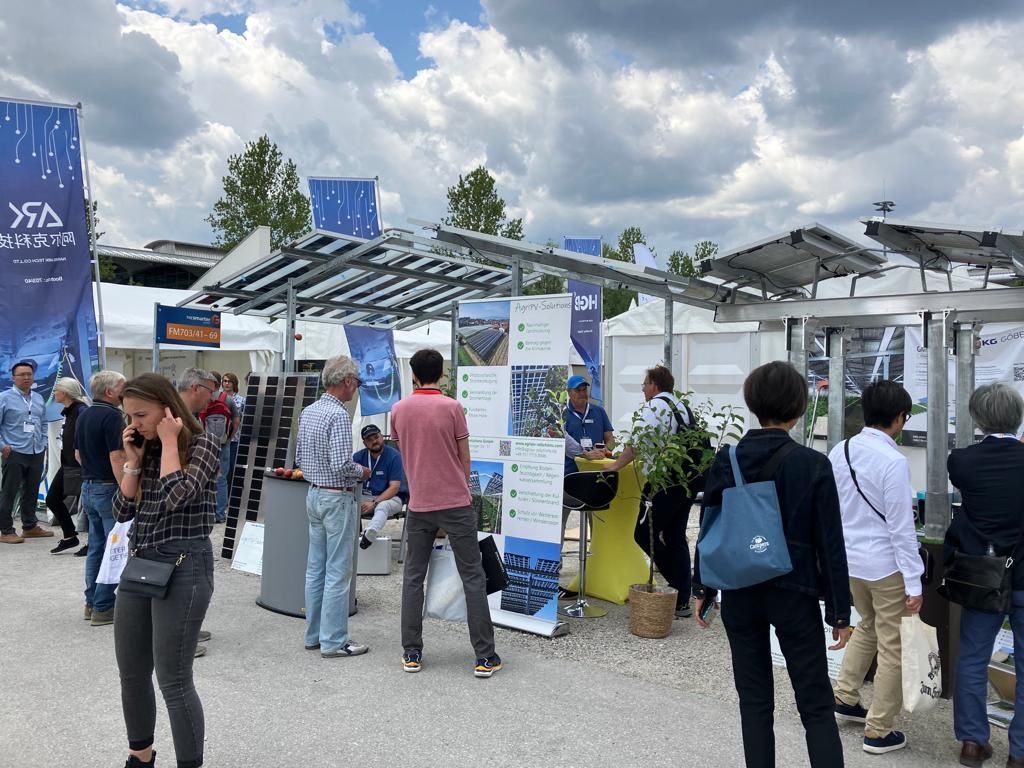Here you can find all the news
!We AgriPV-Solutions will be represented for you at the expoSE trade fair in Karlsruhe!
When: 20 - 21 November 2024; Wednesday - Thursday from 9:00 am - 5:00 pm
Where: Karlsruhe Trade Fair Centre, Messeallee 1 - 76287 Rheinstetten - Germany
Stand number: Hall 2 - 28 - We look forward to your visit
We would be very pleased to welcome you in large numbers!


Inauguration of our agrivoltaic project in Karlsruhe - LTZ Augustenberg
Article in Badische neueste Nachrichten Karlsruhe:
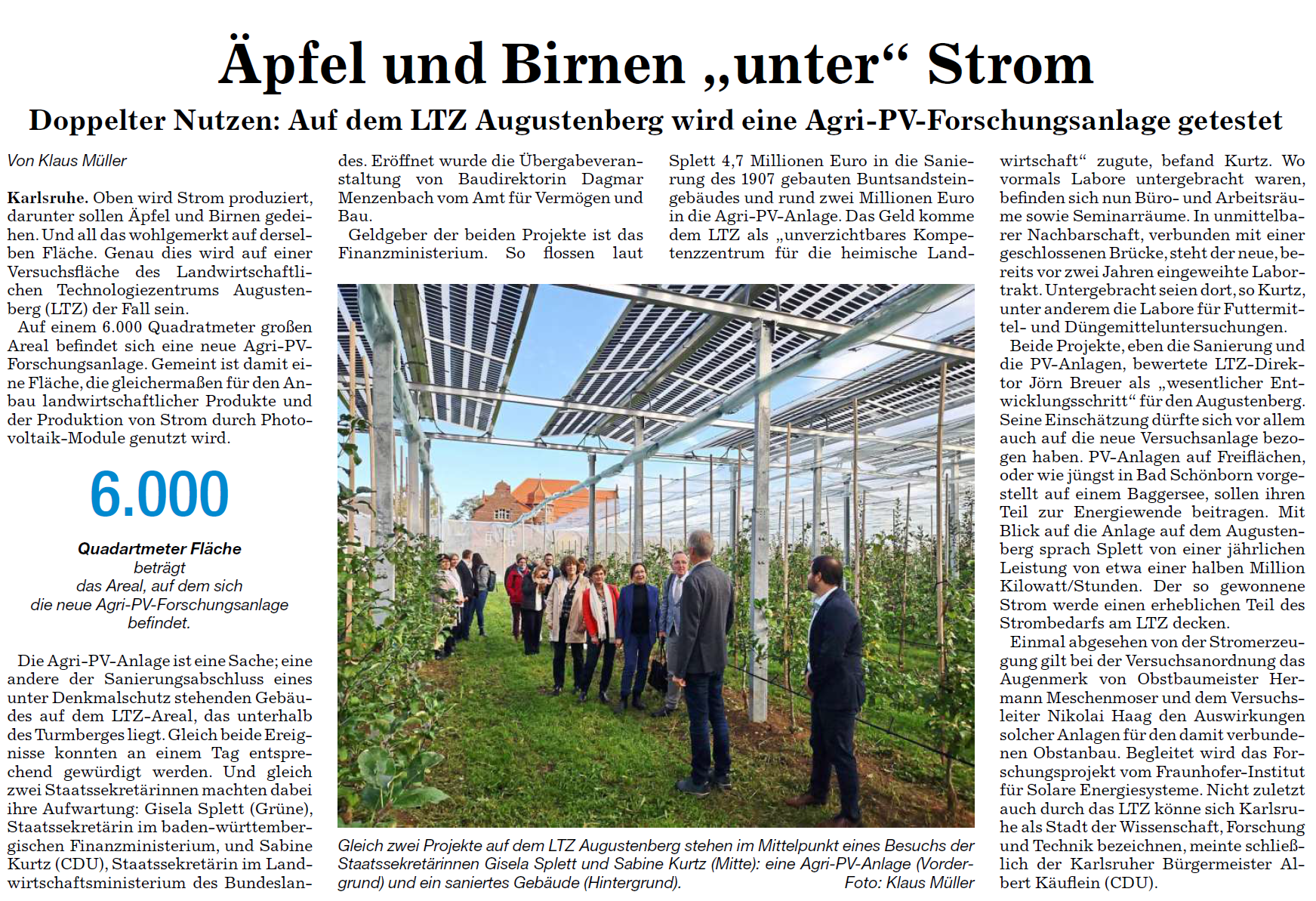
Article in the city newspaper:

Inauguration of our agrivoltaic project in Frick AG - Research Institute of Organic Agriculture (FiBL):
Interview - SRF:
Aargau: Solar system to protect apples and pears from weather extremes
Agricultural Engineering Switzerland:
Start of ‘AgriSolar Research’ at FiBL
Aargauer Zeitung:
More beautiful organic apples and produce electricity on top: Aargau is forging ahead with these innovative solar systems
Swiss farmer:
Agri-photovoltaic reference system at the HGU in Geisenheim - The future of German Wine
Click here for the video:
Federal Minister of Food and Agriculture Mr Özdemir with Martin Stiegler - Farmer of the Year 2023
Planned Agri-PV system from AgriPV-Solutions on hazelnuts with transparent modules to combine crop cultivation (hazelnuts), animal husbandry (chickens) and green electricity production on one area
Model of the planned agrivoltaic system from AgriPV-Solutions
Click here for the article:
Özdemir beim Landwirt des Jahres: „So etwas habe ich noch nicht gesehen.“ | agrarheute.com
!We AgriPV-Solutions will be at the INTERSOLAR EUROPE fair in Munich for you!
Wann: 19. - 21. June 2024; Wednesday / Thursday from 9:00 - 18:00 and Friday from 9:00 - 17:00
Wo: Fair Munich, Exhibition Center, 81823 Munich, Germany
Standnummer: Hall A4.652 - We look forward to your visit
We would be very pleased to welcome you in large numbers!


Informative presentations on agrivoltaics in fruit, berry and wine growing:
!We AgriPV-Solutions will be represented for you at the FRUCHTWELT BODENSEE trade fair in Friedrichshafen!
When:
February 23 - 25, 2024; Friday - Saturday - Sunday from 9:00 a.m. to 5:00 p.m.
Where:
Messe Friedrichshafen, Neue Messe 1 - 88046 Friedrichshafen - Germany
Stand number:
Hall B4 - 712 - We look forward to your visit
We would be very pleased to welcome you in large numbers!

TFZ Bavaria publishes Agri-Photovoltaics Guide:
The TFZ's Agri-Photovoltaic Guide is intended to explain the complex procedures involved in the planning and approval of Agri-PV projects as clearly as possible.
https://www.solarserver.de/2023/11/01/tfz-bayern-veroeffentlicht-agri-photovoltaik-leitfaden/?utm_source=newsletter&utm_campaign=newsletter
TFZ report as PDF file:
KlimaZeit: The future of viticulture - how photovoltaic systems could ensure greater sustainability:
https://www.ardmediathek.de/video/tagesschau24/zukunft-des-weinbaus-mit-photovoltaik/tagesschau24/Y3JpZDovL3RhZ2Vzc2NoYXUuZGUvMmRhNDBkNmMtNTA3OS00ODIzLTk1YTUtZGE5OWI0OGQ4ZTJh
!We AgriPV-Solutions will be present for you at the exhibition Oberschwabenschau in Ravensburg!
When:
October 18 to 22, 2023, daily from 9 a.m. to 6 p.m.
Where:
Bleicherstrasse 20, 88212 Ravensburg, Germany
Hall:
Special show the green path, Hall 9
We would be very pleased about numerous attendance!
Site plan:
Where farmers benefit from Solar Package 1 - and where it burdens them:
https://www.agrarheute.com/politik/landwirte-solarpaket-1-profitieren-belastet-610413?utm_campaign=ah-sonder-nl&utm_source=ah-nl&utm_medium=newsletter-link&utm_term=2023-09-25
NEWS!!! Adoption of the first solar package of the federal government
The time has finally come, the Federal Government has passed the first of two solar packages, which are intended to promote the expansion of photovoltaics, including
agri-photovoltaics, in Germany.
We would like to take the next step with you and advance your individual project.
Simply fill out our
contact form, and we will get in touch with you as soon as possible!
What does this mean for your Agri-Photovoltaic system?
Firstly, the solar package provides for a separate sub-segment (tender) for innovative solar plants such as Agri-PV with a higher subsidy (maximum value 9.5 ct/kWh). The tenders are to be increased to three gigawatts per year in a phased model.
Likewise, Agri-PV systems that demonstrably reduce the use of pesticides are to receive a subsidy bonus (further subsidy options). The prerequisite is a clear height of the plant of at least 2.10 m (DIN SPEC standardization).
Link to the solar package of the federal government:
https://www.bmel.de/SharedDocs/Meldungen/DE/Presse/2023/230816-agri-pv.htm
World's leading solar trade fair, Intersolar Europe in Munich 2023
Super trade fair days at the Intersolar Europe in Munich!
We, the team of AgriPV-Solutions GmbH, would like to thank you for your visit and the good conversations at our booth.
We hope that you found the trade fair valuable and enriching.
For our part, we made every effort to provide our visitors with the relevant information on the subject of agri-photovoltaics.
We are looking forward to next year!
Vertical Agri-PV: For which farmers is the cheapest system worthwhile?
Draft law on faster building permits, as of 30.03.2023:
Poster of the Research Forum of the University of Geisenheim (HGU) regarding our joint research project in existing viticulture:

Newspaper report regarding our project in Geisenheim in the existing vineyard:


!We AgriPV-Solutions will be at the INTERSOLAR EUROPE fair in Munich for you!
When: 14 - 16 June 2023; Wednesday, Thursday from 9:00 - 18:00 and Friday from 9:00 - 17:00.
Where: Fair Munich, Exhibition Center, 81823 Munich, Germany
Booth number: Outdoor Area - FM.703/48
We would be very pleased to welcome you in large numbers!
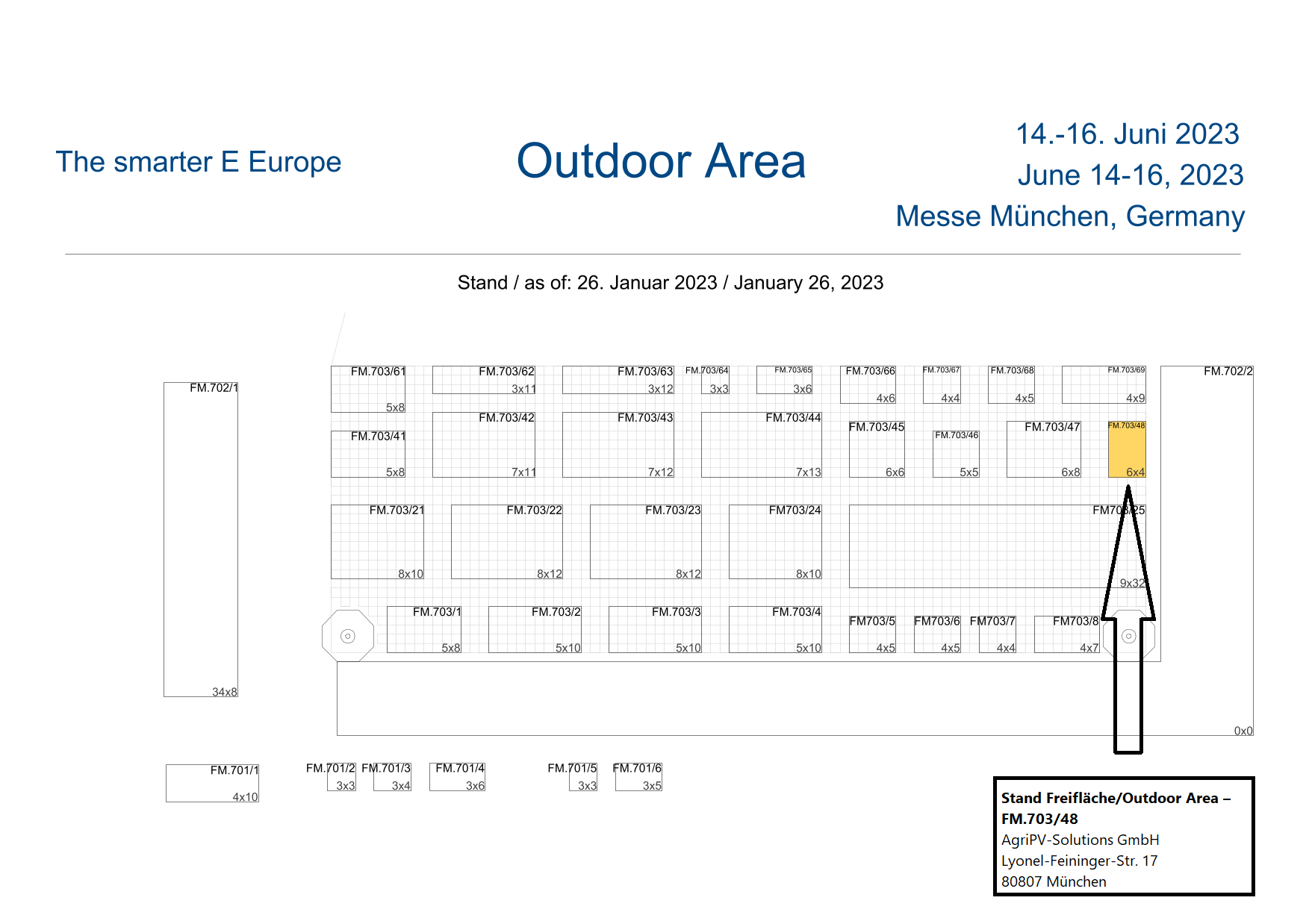
Newspaper report by Hubert Bernhard regarding the harvest / water consumption of our first pilot project in Kressbronn, Agri-Photovoltaic in the existing apple orchard:

Article of the Bayrischen landwirtschaftlichen Wochenblatt regarding the innovations for Agri-Photovoltaik in 2023 and our pilot project in Kressbronn, apple cultivation:
Current information regarding the electricity price brake:
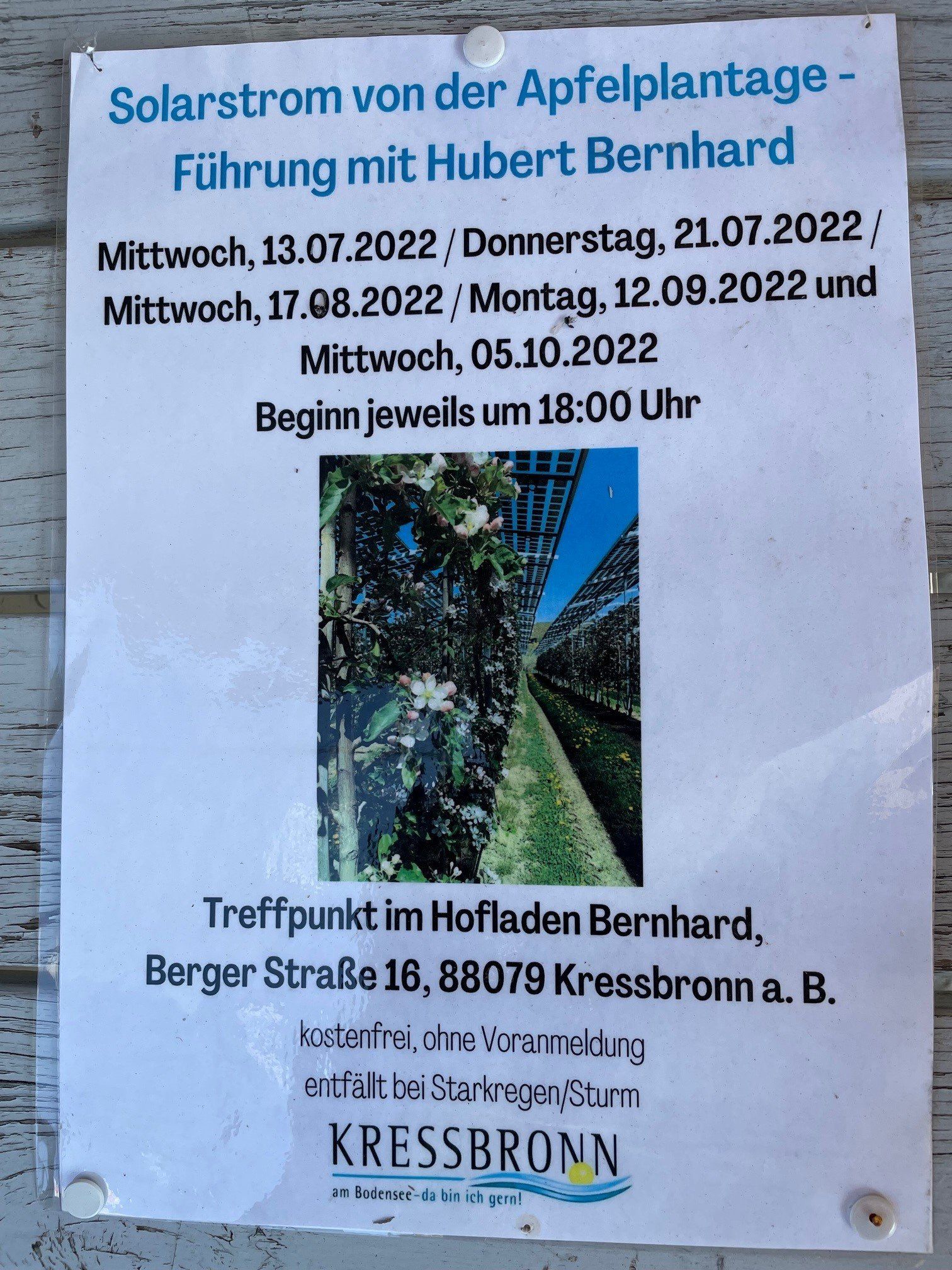
Invitation Opening of the first AGRI PV photovoltaic system in the existing orchard
As part of the research project "Model Region Agri-Photovoltaics for Baden-Württemberg", funded by the Ministries of Environment, Climate and Energy Management as well as Food, Rural Areas and Consumer Protection, 13 project partners will build and research five by 2024 Agri-PV pilot plants in Baden-Württemberg.
On May 14, 2022, the first AgriPV plant built by us in an existing orchard was ceremonially commissioned in the presence of Winfried Kretschmann, Minister President of Baden-Württemberg. In a few weeks the harvest of the apples ripened under this AgriPV plant will start.
We will keep you up to date.
First Agri-PV plant in old apple orchard
Arriving at the orchard, there is hardly a parking space free, police and security officials announce political celebrities in advance. Because to the official inauguration the local Prime Minister Winfried Kretschmann comes. Of course, the responsible scientists will also be there, such as Prof. Andreas Bett, Director of Fraunhofer ISE, and Oliver Hörnle, the responsible project manager from Fraunhofer ISE.
The project is scientifically supported by the Fraunhofer Institute for Solar Energy Systems ISE in Freiburg, funded by the Baden-Württemberg Ministries of the Environment, Climate and Energy and Food, Rural Areas and Consumer Protection with 13 project partners.
Five agri-PV pilot plants are to be built and researched in Baden-Württemberg by 2024, as Kretschmann explained in his address, "Around 1,200 farms with commercial fruit growing currently produce an apple volume of around 300,000 tons per year in the Lake Constance region. Energy and food production are basic needs, how do the two go together? With Agri-PV, you can harvest twice: Apples and solar power."
But there are still unanswered questions, as the premier continues: "How do Agri-PV systems help with hail? What about crop yield? Does it reduce plant diseases and pest infestations? And how can social acceptance be increased? The Kressbronn project could provide answers to these questions, which is why we funded it with 315,000 euros. This PV roof over apples literally takes solar energy to a new level."
Prof. Andreas Bett, Director of Fraunhofer ISE referred to the long history of the institute: "We have been doing applied research for over 70 years with a current turnover of 100 million euros. Of this, we have to acquire 90 percent ourselves. The Fraunhofer Institute develops technologies and wants to bring innovations forward. Especially to drive the energy transition forward, it needs motivated employees." With this, he referred to the founder Prof Alfred Götzberger, who initiated the first Agri-PV back in 1980.
For specialty crops in climate change
Agri-PV is a smart solution for fruit and wine growers to reduce the impact of climate change on their crops. The highlight: Protective photovoltaic modules can be used to generate much-needed green electricity at the same time.
Many berries are very sensitive to the weather. Above all, they need to be protected from too much sun and rain. Often, just before harvesting, a roof is installed to protect the berries from moisture and maintain their quality, which causes high costs and enormous labor. Bush berries suffer more and more frequently from sunburn, which makes them inedible (currants, raspberries, blackberries and especially gooseberries are particularly sensitive). Even with the increasingly frequent air temperatures of over 30 °C and fruit temperatures of over 40 °C, the first damage occurs.
Regional grape varieties in particular are also sensitive to climatic changes. Rising temperatures result in higher sugar content in the grapes and less acidity. This can lead to an undesirable alignment of flavor characteristics. Increasingly frequent hail events also play a major role in viticulture. Warm, humid weather, in turn, unfortunately creates ideal conditions for the spread of fungal infections.
Triad: green power, higher yields, nature conservation
Oliver Hörnle, the responsible project manager at Fraunhofer ISE, explained about the realized project in Kressbronn: "We are trying to research and implement a triad here: Green electricity, additional agricultural yield through shading and, thirdly, nature conservation through less pesticides. In addition to interdisciplinary cooperation, a project like this requires above all local structures and motivated, progressive farmers like Hubert Bernhard."
Hubert Bernhard had the initial idea for the Agri-PV system in his apple orchard in 2019. Through his good networking, he is active in orchard organizations as well as machinery ring chairman, he successfully sought partners: "Despite supply chain bottlenecks, a very fast construction period from February to April could be implemented. I was very well supported by the responsible building authority, which I don't think is the case everywhere." With this PV system, he has also thought of and for his next generation; the two daughters are already waiting in the wings at his fruit farm.
Transparent PV modules with roof pitch
The Kressbronn project involves the superstructure of a 0.3 ha apple orchard with an agri-photovoltaic system. Two variants of semi-transparent glass-glass modules with a transparency between 40 and 50 % are installed. The nearly 1120 modules each have an output of between 170 Wp (1.7 m x 1 m) and 260 Wp (2 m x 1 m). This results in a total output of approximately 240 kWp.
On the inauguration day, the sky was overcast and light drizzle set in at times, but you could hear from the inverters under the sun roof that solar power was already being generated. The system has a substructure with an east-west orientation. "We rely on proven, highly stable and corrosion-resistant metal structures. The support tubes are inserted into metal sleeves previously driven into the ground. In the process, the plants are hardly affected. The solar modules are permanently and securely connected to the substructure. Here in Kressbronn for dual use in fruit and berry cultivation," as Thomas Franke of Agri-PV-Solution, the planning office involved, explains.
For better solar yield and self-cleaning of the modules, the mounting table has an inclination of at least 10°. An opening is provided at the ridge of the roof for optimal air circulation. Depending on the requirements and the type of plant, the clear height is around 3.50 m. The trafficability of the plant is guaranteed. According to Agri-PV-Solution, the supporting structure is statically calculated and can withstand high wind speeds.
As a rule, the customer becomes the owner and operator of the photovoltaic plant. But also the foundation of an energy cooperative makes sense, because it involves the local people. Last but not least, a cooperative offers financial returns, a say in the matter, exchange among like-minded people and self-consumption of the electricity generated.
Photovoltaic self-consumption is worthwhile if the electricity costs saved are greater than the feed-in tariff. The excess electricity is ideally fed into the grid via the local energy supplier.
However, direct marketing can also be worthwhile in view of the rapid rise in electricity prices on the stock exchange. For example, a high proportion of the energy generated in apple production should be used particularly effectively in upstream and downstream areas on site in a decentralized manner - be it in the storage of apples in cold storage or through the use of electrified agricultural machinery.
Agri-PV well suited for orchards
"Agri-PV offers a very interesting approach with a triple return," the experts emphasized. This is because Agri-PV not only saves valuable land, but also harvests sunshine and fruit at the same time, they said. With its large fruit-growing areas in the Lake Constance region, sunny Baden-Württemberg offers ideal conditions and opportunities for Agri-PV.
The concept of this Agri-PV system for orchards seems to make a lot of sense, especially since many systems have some kind of roofing anyway and the landscape does not change seriously.
Then, in a few years, when you go to the Lake Constance region with an e-car, will the plastic hail protection nets be replaced by PV modules? Then you can "fill up" your e-vehicle with green electricity at the numerous e-pumps and buy fresh, healthy Lake Constance fruit from the various farm stores and enjoy it at home later.
Covered hop garden
In Bavaria, too, an Agri-PV system for specialty crops is in the starting blocks: Josef Wimmer, a hop farmer from Au in der Hallertau, also plans to use the long-term and climate-relevant as well as crop-growing approach for his hop gardens several times over. For example, his existing plant, i.e. the hop garden, is to be covered with PV modules at a lofty height. The construction project is scheduled for fall 2022. The Fraunhofer Institute for Solar Energy Systems wants to scientifically accompany and evaluate the project.
This agri-PV system above the hops will generate electricity and at the same time protect the hop plants from hail and too much sun. The planned solar modules, including additional masts, will require an investment of around €800,000, which could be paid off after 12 to 15 years. After all, with a runtime of 30 to 40 years, Josef Wimmer could earn three times more with electricity from solar energy than from hops. In addition to scientific support, hop garden owner Josef Wimmer would also be pleased to receive appropriate financial support or grants or subsidies. Since the hop poles are usually up to 7 meters high, the installation of the solar modules in the hop garden must be carried out at a height of 8 meters. Therefore, some professional colleagues view the concept of hop cultivation and solar installation rather critically, especially with the increasing extreme weather conditions such as storms and hail.
For specialty crops in climate change
Agri-PV is a smart solution for fruit and wine growers to reduce the impact of climate change on their crops. The highlight: protective photovoltaic modules can be used to generate much-needed green electricity at the same time.
Many berries are very sensitive to the weather. Above all, they need to be protected from too much sun and rain. Often, just before harvesting, a roof is installed to protect the berries from moisture and maintain their quality, which causes high costs and enormous labor. Bush berries suffer more and more frequently from sunburn, which makes them inedible (currants, raspberries, blackberries and especially gooseberries are particularly sensitive). Even with the increasingly frequent air temperatures of over 30 °C and fruit temperatures of over 40 °C, the first damage occurs.
Regional grape varieties in particular are also sensitive to climatic changes. Rising temperatures result in higher sugar content in the grapes and less acidity. This can lead to an undesirable alignment of flavor characteristics. Increasingly frequent hail events also play a major role in viticulture. Warm, humid weather, in turn, unfortunately creates ideal conditions for the spread of fungal infections.



